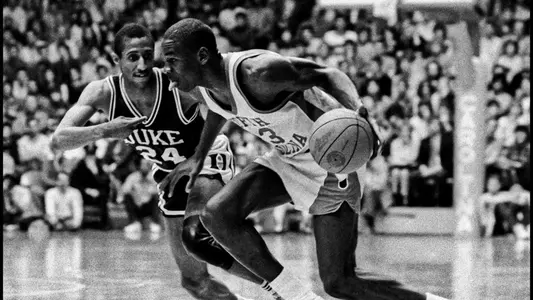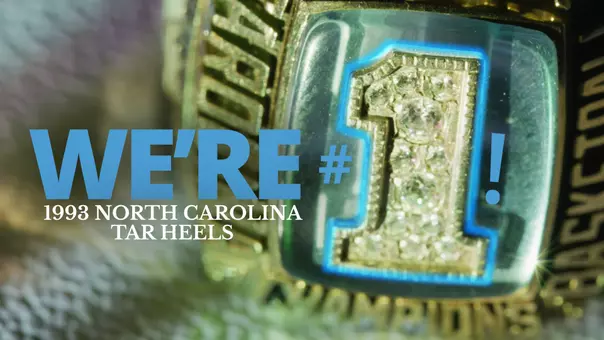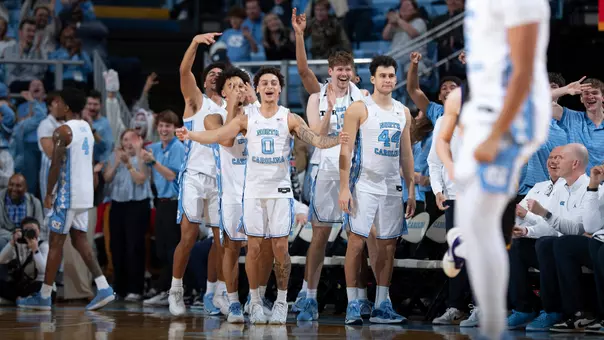University of North Carolina Athletics

Lucas: Last Dance Rapid Reactions Night 3
May 3, 2020 | Men's Basketball, Featured Writers, Adam Lucas
Quick takeaways from the third night of ESPN's Michael Jordan documentary.
By Adam Lucas
1. Sunday night's pair of episodes might be the best yet. We still got some footage of Jordan as a Tar Heel in the first episode, plus some quick shots of him walking across campus. And we also got the Bulls at the absolute peak of their fame.
2. Sunday night's episodes did a good job chronicling the hysteria surrounding the 1992 Olympic Dream Team. It received less attention that Jordan also played on the Olympic team in 1984, when he teamed with fellow Tar Heel Sam Perkins to play for Bob Knight. The team won the gold medal, but playing for the volatile Knight was a new experience for Jordan. Perkins appeared on the Carolina Insider podcast last summer and relayed the following story: "He yelled at everybody on that team. Michael had a game where he had so many turnovers and he told him, 'You should apologize to everyone in the locker room for how you played today.' We didn't really think he'd had that bad a game. Michael was a couple stalls down from me and he was crying."
3. A little surprising that there was no mention of the scrimmages between the 1992 Dream Team and the team of collegians during the Olympic warmup process (of course, the documentary wasn't created solely for Tar Heel fans). Eric Montross played on that team of collegians, and Roy Williams was one of the coaches for that group. That team defeated the Olympians in a closed scrimmage, and as Williams has since told the story, the overeager college players did some woofing after their win (this is the same game that Mike Krzyzewski has said Chuck Daly "threw," but hasn't found much corroboration). The teams had a rematch the next day, and the Dream Team predictably throttled the college team.
4. You can't help but wish that Dean Smith and/or Bill Guthridge had been around to be interviewed for this documentary. Also on that list: Woody Durham. He likely would have told the following story, which can be found in his book, "A Tar Heel Voice":
"In the fall of 1981, Coach Smith and I attended an event on campus, and he made some short remarks. I drove him back to Carmichael Auditorium. I said, "Coach, how's practice going?" He said, "Well, pretty good." Of course, I knew that James Worthy and Jimmy Black and Matt Doherty and Sam Perkins were back, and there was no question about how good they were. That's when Coach Smith made the greatest understatement of all time: "I think the young man from Wilmington might be able to help us." I remember that like it was yesterday. The young man from Wilmington was Michael Jordan, and he did turn out to be quite a help."
5. Another story Woody told about Jordan: the most underrated part of his performance against Georgetown in the 1982 championship game came on the defensive end. On the fateful play when the Hoyas' Fred Brown threw the ball to James Worthy to preserve Carolina's title, it was Jordan who stepped into the passing lane to block a potential pass from Brown to Sleepy Floyd. As Woody said, "That one step by Jordan changed the entire play and might have changed the entire game." Those defensive instincts never changed, as Jordan was an All-NBA Defensive first team selection from 1988-1993 and 1996-98, and the league's defensive player of the year in the 1987-88 season.
6. Patrick Ewing and Michael Jordan: joined from the very beginning of their college careers, when they faced off in the 1982 NCAA championship game. But Ewing could never surpass Jordan, and never really got that close (other than the 1993 playoffs, as was detailed in tonight's second episode).
7. Some good Jordan on the golf course footage in the second episode. Not mentioned: Jordan learned the game while at Carolina, and he had a pretty good introduction--future PGA professional Davis Love III was the Tar Heel who first took Jordan (and close friend and teammate Buzz Peterson) to UNC Finley to pick up the game. The introduction came in the spring of 1984, after Carolina had been eliminated from the NCAA Tournament by Indiana, leaving Jordan with some unexpected free time.
8. The episode also a slight window into why Jordan loves Carolina so much. It wasn't expressly pointed out Sunday night, but it was clear being Michael Jordan wasn't always a lot of fun, because he wasn't always sure what people wanted from him. Back in Chapel Hill, though, he could return to people who liked him and supported him before he was a worldwide icon.
9. It looks like next week's first episode will be an emotional one, since we've advanced to the point that Jordan's father was murdered. James Jordan has been a secondary character so far, but that should change next week.
10. The documentary has been terrific, and Sunday night's two episodes were no different. Jordan is transcendent, and it's been glorious to introduce him to a generation that never got to experience his talent in person. But in all that nostalgia is also the fact that part of the enjoyment of this documentary has been remembering how and who you experienced it with the first time around. I've gotten to tell my kids lots of stories about my dad taking me to see Jordan play--he would make a special effort to take me to Chicago to see at least one Bulls game per season, because he correctly said, "You will never see this again in your lifetime, and he's from Carolina"--and that's as special to me as celebrating Jordan's greatness.
1. Sunday night's pair of episodes might be the best yet. We still got some footage of Jordan as a Tar Heel in the first episode, plus some quick shots of him walking across campus. And we also got the Bulls at the absolute peak of their fame.
2. Sunday night's episodes did a good job chronicling the hysteria surrounding the 1992 Olympic Dream Team. It received less attention that Jordan also played on the Olympic team in 1984, when he teamed with fellow Tar Heel Sam Perkins to play for Bob Knight. The team won the gold medal, but playing for the volatile Knight was a new experience for Jordan. Perkins appeared on the Carolina Insider podcast last summer and relayed the following story: "He yelled at everybody on that team. Michael had a game where he had so many turnovers and he told him, 'You should apologize to everyone in the locker room for how you played today.' We didn't really think he'd had that bad a game. Michael was a couple stalls down from me and he was crying."
3. A little surprising that there was no mention of the scrimmages between the 1992 Dream Team and the team of collegians during the Olympic warmup process (of course, the documentary wasn't created solely for Tar Heel fans). Eric Montross played on that team of collegians, and Roy Williams was one of the coaches for that group. That team defeated the Olympians in a closed scrimmage, and as Williams has since told the story, the overeager college players did some woofing after their win (this is the same game that Mike Krzyzewski has said Chuck Daly "threw," but hasn't found much corroboration). The teams had a rematch the next day, and the Dream Team predictably throttled the college team.
4. You can't help but wish that Dean Smith and/or Bill Guthridge had been around to be interviewed for this documentary. Also on that list: Woody Durham. He likely would have told the following story, which can be found in his book, "A Tar Heel Voice":
"In the fall of 1981, Coach Smith and I attended an event on campus, and he made some short remarks. I drove him back to Carmichael Auditorium. I said, "Coach, how's practice going?" He said, "Well, pretty good." Of course, I knew that James Worthy and Jimmy Black and Matt Doherty and Sam Perkins were back, and there was no question about how good they were. That's when Coach Smith made the greatest understatement of all time: "I think the young man from Wilmington might be able to help us." I remember that like it was yesterday. The young man from Wilmington was Michael Jordan, and he did turn out to be quite a help."
5. Another story Woody told about Jordan: the most underrated part of his performance against Georgetown in the 1982 championship game came on the defensive end. On the fateful play when the Hoyas' Fred Brown threw the ball to James Worthy to preserve Carolina's title, it was Jordan who stepped into the passing lane to block a potential pass from Brown to Sleepy Floyd. As Woody said, "That one step by Jordan changed the entire play and might have changed the entire game." Those defensive instincts never changed, as Jordan was an All-NBA Defensive first team selection from 1988-1993 and 1996-98, and the league's defensive player of the year in the 1987-88 season.
6. Patrick Ewing and Michael Jordan: joined from the very beginning of their college careers, when they faced off in the 1982 NCAA championship game. But Ewing could never surpass Jordan, and never really got that close (other than the 1993 playoffs, as was detailed in tonight's second episode).
7. Some good Jordan on the golf course footage in the second episode. Not mentioned: Jordan learned the game while at Carolina, and he had a pretty good introduction--future PGA professional Davis Love III was the Tar Heel who first took Jordan (and close friend and teammate Buzz Peterson) to UNC Finley to pick up the game. The introduction came in the spring of 1984, after Carolina had been eliminated from the NCAA Tournament by Indiana, leaving Jordan with some unexpected free time.
8. The episode also a slight window into why Jordan loves Carolina so much. It wasn't expressly pointed out Sunday night, but it was clear being Michael Jordan wasn't always a lot of fun, because he wasn't always sure what people wanted from him. Back in Chapel Hill, though, he could return to people who liked him and supported him before he was a worldwide icon.
9. It looks like next week's first episode will be an emotional one, since we've advanced to the point that Jordan's father was murdered. James Jordan has been a secondary character so far, but that should change next week.
10. The documentary has been terrific, and Sunday night's two episodes were no different. Jordan is transcendent, and it's been glorious to introduce him to a generation that never got to experience his talent in person. But in all that nostalgia is also the fact that part of the enjoyment of this documentary has been remembering how and who you experienced it with the first time around. I've gotten to tell my kids lots of stories about my dad taking me to see Jordan play--he would make a special effort to take me to Chicago to see at least one Bulls game per season, because he correctly said, "You will never see this again in your lifetime, and he's from Carolina"--and that's as special to me as celebrating Jordan's greatness.
WBB: Post-Boston College Press Conference - Dec. 29, 2025
Tuesday, December 30
UNC Women's Basketball: Tar Heels Run Through Eagles, 90-39
Tuesday, December 30
MBB: "We're No. 1 - The 1993 UNC Tar Heels" Trailer
Monday, December 29
Carolina Women's Basketball 2025-26 | In Pursuit: Episode 3 - "Joy and Fire"
Wednesday, December 24














